
This exquisite instrument, appearing untouched by time, is a testament to craftsmanship, fashioned from pine and adorned with an intricate design of red, green, and black hues resembling a blossoming flower. It is proudly showcased at the Robert Burns Birthplace Museum in Alloway, known as ’the fiddle of William Gregg’. Born in 1766 in Ayr, Gregg’s affinity for the violin blossomed from an early age, eventually propelling him into the role of a “Dance Tutor” or a “Master of Manners” in Tarbolton, Ayrshire. It was in 1779 that he took on an unusual pupil: none other than Robert Burns himself.
Burns would later reminisce, recalling that “In my seventeenth year, to refine my deportment, I enrolled in a country dancing school. My father harboured an inexplicable aversion to such gatherings; my attendance there was, in hindsight, an act of complete defiance against his wishes. As previously stated, my father’s emotions were intense; this act of rebellion seemed to sour his regard for me…” (Letter to Dr John Moore, Mauchline, 1787, RBWF 2018). Burns was undoubtedly aware that his father perceived “country music” as sinful, which likely fueled his determination to attend these lessons—part cheek and part personal enjoyment. During these sessions, William Gregg’s violin would have provided the musical accompaniment. While “violin” and “fiddle” refer to the same instrument, they evoke distinct playing styles: the former aligns with classical compositions, while the latter summons a jaunty, folk-oriented, and traditional Ayrshire sound.
Folk music, particularly the tunes resonating through Scotland, held a pivotal place in Burns’s poetry. In fact, it often served as a catalyst for his creative expression. In one of his rare reflective pieces, he characterizes words as transient entities, tethered to specific times and places, while music retains a timeless essence:
“Music is the language of nature: and poetry, particularly songs, are always more or less localised… Due to temporal and geographical alterations, many of our Scots tunes have outlasted their original verses, and even subsequent sets: occasionally, only a single name, a phrase, or a couple of lines remain, simply to distinguish the melodies.” (Notes found in Burns’s personal copy of James Johnson, The Scots National Museum, 1787-1803).
The fiddle holds a distinct position within this musical heritage, forming the melodic backdrop for a multitude of Burns’s lyrics: jigs (My Girl She’s Airy), reels (The Reel o’ Stumpie), and strathspeys (Act Sederunt of the Session). These tunes have a rich association with the fiddle. It’s also noted that Burns had a rudimentary grasp of fiddling.
Folk music not only occupied a significant place in Burns’s role as a poet, but it also played a pivotal role in his enduring fame. As the Romantic movement emphasized locality and the celebration of rustic heritage, Burns emerged as a prominent figure in the burgeoning pan-European “folklorism.” As this movement spread across nations, it was hailed as part of a new era of artistic and intellectual expression following the dominance of French, Greek, and Roman-inspired Neoclassicism.
Upon William’s passing in the early 1800s, the fiddle was passed down through successive generations of the Gregg family, though it lay dormant and unplayed. It wasn’t until 1995 that Wallace Galbraith, a member of the Ayrshire Fiddle Orchestra, stumbled upon its existence on a farm near Mauchline. The farm was owned by Major John Weir, then Chairman of the Bachelors’ Club—an intellectual society founded by Burns in 1780, initially reserved for bachelors. Galbraith took the instrument to David Martin, a skilled violin restorer and retired scholar, who meticulously restored it to its current state. The fiddle embarked on a global tour with the Orchestra for several years before finding its permanent home at the Robert Burns Birthplace Museum in Alloway.
A guide track for ‘The Gregg Fiddle’ is available below for listening: -
The track is additionally available within the following collections and sets: -
Associated Collections: -
9/8
Bachelors Club
Bagpipe
Jig
Not Yet Recorded
Robert Burns
The Tarbolton Collection
The Three Six Five Collection
Associated PDF Download Sets: -
March 1

